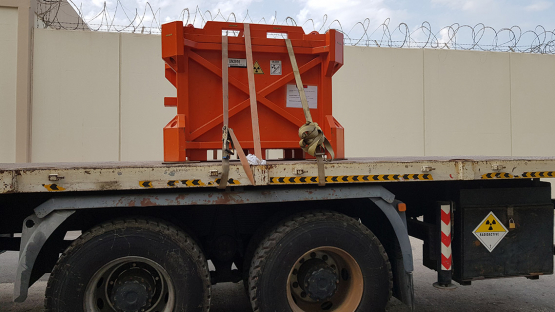A disused sealed radioactive source (DSRS) has been successfully removed from a public hospital in Bahrain and shipped to a safe and secure storage facility abroad with support from the IAEA, despite increased challenges in conducting operations like this during the global pandemic. The highly specialized operation, which was completed in March, represents a milestone in the island nation’s efforts to strengthen control of its radioactive sources and further improve its overall national nuclear safety and security regime.
“Managing disused sources appropriately helps protect them from misuse that could lead to accidental radiation exposure or criminal activity,” said Elena Buglova, Director at the IAEA’s Division of Nuclear Security. “As many countries experience challenges in the management of DSRSs, the IAEA has been implementing national, regional and interregional projects to enhance global nuclear security and build capacities in Member States.” Last year, the IAEA provided similar assistance to Colombia and the Republic of Congo.
Within the framework of its Integrated Nuclear Security Support Plan (INSSP), Bahrain requested assistance from the IAEA to remove the DSRS, which was used in a blood irradiator and stored at a public hospital. Shortly before the outbreak of the COVID-19 pandemic, the IAEA launched a project to remove and transport the source to a safe and secure location abroad for final management.
Blood irradiators are used in blood transfusions, organ transplants and bone marrow transplants to sterilize blood components to avoid transmission of disease in case of contaminated blood products.
“Radioactive sources provide many benefits,” said Bulgova. “But they need to be managed safely and securely while in use and they can remain radioactive for a long time, so it is just as important that they are safely and securely managed in a sustainable way once they reach the end of their useful lives.”
Complex field operations involving disassembly of radioactive devices and international transport require highly specialized expertise and often pose technical challenges, for example due to the condition of the device and need for sophisticated and tailored equipment. These difficulties have been heightened under the ongoing COVID-19 pandemic, with stringent border restrictions and increased health and safety measures.
“Unusual times call for innovative solutions. In order to continue to support Bahrain, we had to adapt and find new ways to facilitate field operations,” said Christophe Xerri, IAEA Director of Nuclear Fuel Cycle and Waste Technology, “In this case, a virtual oversight system was established to monitor the operation and ensure close contact between the IAEA, the service provider and local authorities.”
“Despite numerous technical and logistical challenges, the implementation of the field operation moved smoothly and with great success,” said Jafaar Matar, Radiation Protection Consultant at Bahrain Ministry of Health, “As a result, we have taken a step forward in strengthening nuclear security in Bahrain, thanks to the shared commitment and coordination of all stakeholders, including Bahrain’s Supreme Council for the Environment, the Ministry of Interior, the removal service provider and the IAEA.”
Through a multi-regional project, the IAEA is assisting participating countries to enhance nuclear security by improving security and safety of national inventories of DSRSs through large scale field operations and complementary capacity building for enhanced sustainability.







